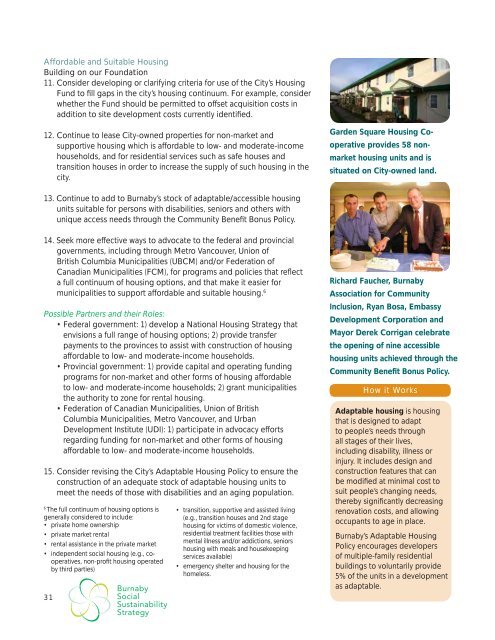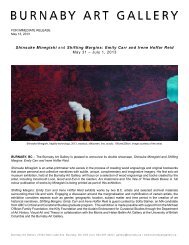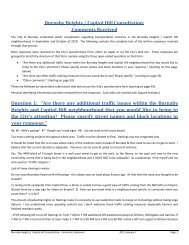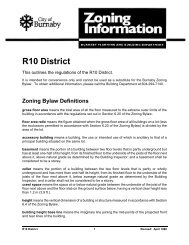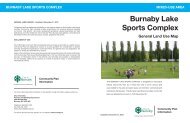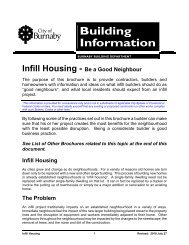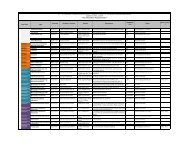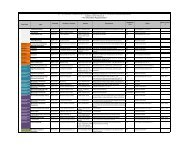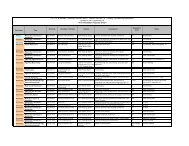Burnaby Social Sustainability Strategy - City of Burnaby
Burnaby Social Sustainability Strategy - City of Burnaby
Burnaby Social Sustainability Strategy - City of Burnaby
You also want an ePaper? Increase the reach of your titles
YUMPU automatically turns print PDFs into web optimized ePapers that Google loves.
Affordable and Suitable Housing<br />
Building on our Foundation<br />
11. Consider developing or clarifying criteria for use <strong>of</strong> the <strong>City</strong>’s Housing<br />
Fund to fill gaps in the city’s housing continuum. For example, consider<br />
whether the Fund should be permitted to <strong>of</strong>fset acquisition costs in<br />
addition to site development costs currently identified.<br />
12. Continue to lease <strong>City</strong>-owned properties for non-market and<br />
supportive housing which is affordable to low- and moderate-income<br />
households, and for residential services such as safe houses and<br />
transition houses in order to increase the supply <strong>of</strong> such housing in the<br />
city.<br />
Garden Square Housing Cooperative<br />
provides 58 nonmarket<br />
housing units and is<br />
situated on <strong>City</strong>-owned land.<br />
13. Continue to add to <strong>Burnaby</strong>’s stock <strong>of</strong> adaptable/accessible housing<br />
units suitable for persons with disabilities, seniors and others with<br />
unique access needs through the Community Benefit Bonus Policy.<br />
14. Seek more effective ways to advocate to the federal and provincial<br />
governments, including through Metro Vancouver, Union <strong>of</strong><br />
British Columbia Municipalities (UBCM) and/or Federation <strong>of</strong><br />
Canadian Municipalities (FCM), for programs and policies that reflect<br />
a full continuum <strong>of</strong> housing options, and that make it easier for<br />
municipalities to support affordable and suitable housing. 6<br />
Possible Partners and their Roles:<br />
• Federal government: 1) develop a National Housing <strong>Strategy</strong> that<br />
envisions a full range <strong>of</strong> housing options; 2) provide transfer<br />
payments to the provinces to assist with construction <strong>of</strong> housing<br />
affordable to low- and moderate-income households.<br />
• Provincial government: 1) provide capital and operating funding<br />
programs for non-market and other forms <strong>of</strong> housing affordable<br />
to low- and moderate-income households; 2) grant municipalities<br />
the authority to zone for rental housing.<br />
• Federation <strong>of</strong> Canadian Municipalities, Union <strong>of</strong> British<br />
Columbia Municipalities, Metro Vancouver, and Urban<br />
Development Institute (UDI): 1) participate in advocacy efforts<br />
regarding funding for non-market and other forms <strong>of</strong> housing<br />
affordable to low- and moderate-income households.<br />
15. Consider revising the <strong>City</strong>’s Adaptable Housing Policy to ensure the<br />
construction <strong>of</strong> an adequate stock <strong>of</strong> adaptable housing units to<br />
meet the needs <strong>of</strong> those with disabilities and an aging population.<br />
6<br />
The full continuum <strong>of</strong> housing options is<br />
generally considered to include:<br />
• private home ownership<br />
• private market rental<br />
• rental assistance in the private market<br />
• independent social housing (e.g., cooperatives,<br />
non-pr<strong>of</strong>it housing operated<br />
by third parties)<br />
31<br />
• transition, supportive and assisted living<br />
(e.g., transition houses and 2nd stage<br />
housing for victims <strong>of</strong> domestic violence,<br />
residential treatment facilities those with<br />
mental illness and/or addictions, seniors<br />
housing with meals and housekeeping<br />
services available)<br />
• emergency shelter and housing for the<br />
homeless.<br />
Richard Faucher, <strong>Burnaby</strong><br />
Association for Community<br />
Inclusion, Ryan Bosa, Embassy<br />
Development Corporation and<br />
Mayor Derek Corrigan celebrate<br />
the opening <strong>of</strong> nine accessible<br />
housing units achieved through the<br />
Community Benefit Bonus Policy.<br />
How it Works<br />
Adaptable housing is housing<br />
that is designed to adapt<br />
to people’s needs through<br />
all stages <strong>of</strong> their lives,<br />
including disability, illness or<br />
injury. It includes design and<br />
construction features that can<br />
be modified at minimal cost to<br />
suit people’s changing needs,<br />
thereby significantly decreasing<br />
renovation costs, and allowing<br />
occupants to age in place.<br />
<strong>Burnaby</strong>’s Adaptable Housing<br />
Policy encourages developers<br />
<strong>of</strong> multiple-family residential<br />
buildings to voluntarily provide<br />
5% <strong>of</strong> the units in a development<br />
as adaptable.


